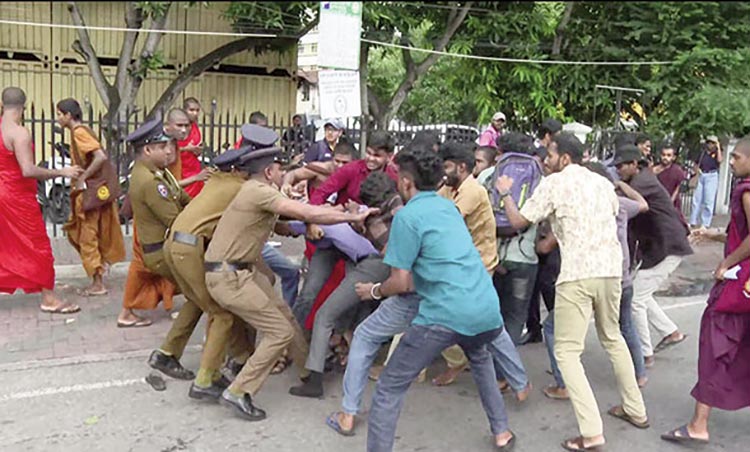News
MONLAR blows whistle on another land grab in wetland sanctuary

By Rathindra Kuruwita
Only a few wetlands remain in Colombo, and they are in danger, Sajeewa Chamikara of the Movement for Land and Agricultural Reform (MONLAR) says.
Chamikara said that Urban Development Authority (UDA) and Sri Lanka Land Development Corporation (SLLDC) have recently begun developing the wetlands around the Sri Mahindaramaya Temple, Ethul Kotte.
“The two institutions started reclaiming the wetlands within the Sri Jayawardenepura Kotte Sanctuary without following any environmental laws. The decision to develop the wetlands was given by President Gotabaya Rajapaksa in March. Although the Wildlife Conservation Department initially opposed the development project, it has chosen to remain silent,” Chamikara said.
The MONLAR head said that during the last two decades SLLDC and UDA had destroyed a large number of wetlands in areas such as Sri Jayawardenepura Kotte and Bellanwila and Attidiya.
“The two institutions have no idea about the importance of these wetlands. Because of their activities, part of Colombo is prone to floods, and the government has to spend colossal amounts of public funds on flood prevention initiatives. The reclamation and alienation of wetlands and their conversion into lakes have taken their toll on the environment. Wetlands have a remarkable capacity to hold water, but they lose that capacity when they are turned into lakes.
Chamikara said migratory bird species that arrive at the wetlands too had been affected by haphazard development projects. When the wetlands in the lowlands close to the sea are excavated, salt water travels inland and salifies the soil.
“The main reason is that the SLLDC and UDA do not have any idea about the Ramsar Convention on Wetlands of International Importance Especially as Waterfowl Habitat of 1971 or the National Wetland Policy and Strategy for Sri Lanka of 2006,” Chamikara said.
Sri Jayawardenepura Kotte Sanctuary is home to a large number of animal species, Chamikara said. “There are 147 indigenous and migratory bird species in this wetland. There are also 18 species of indigenous fish in the canals in the wetlands.
“There are also eight amphibian species besides 67 butterfly species in this sanctuary. Among the butterflies are Tailed Jay, Crimson Rose, Lime Butterfly, Blue Mormon, Lemon Emigrant, Common Jezebel, and Plain Tiger.”
Chamikara said the area was declared a sanctuary on 09 January 1985 by gazette no 331/8. It encompasses 1,110 acres. Anyone who harms the integrity of the wetlands can be produced before a Magistrate as per the Fauna and Flora Protection Ordinance.
“The Magistrate can fine anyone found guilty, send the perpetrator to prison, or both. The Department of Wildlife Conservation has the power to take action against those who violate the provisions of the Ordinance. Therefore, the Department is responsible for putting an end to illegal actions inside the sanctuary,” Chamikara said, adding that Sri Lanka had been a party to the Ramsar Convention since 1987.
Sri Lanka has 198,172 hectares of wetlands under the Convention.
“In 2018, Colombo was declared the first capital to be accredited as an International Wetland City by Ramsar. However, it is estimated that in the last few decades 40% of the wetlands in Colombo have been lost. The World Bank says each year Colombo loses 1.2% of its wetlands, and if it were to lose all its wetlands, the city would be flooded annually costing as much as 1% of its GDP in flood damage. Despite all this we continue to destroy our wetlands,” Chamikara said.
News
FSP asks govt. to pull out of defence deal with India

The Frontline Socialist Party (FSP) yesterday demanded an immediate termination of what it called a “secretive and dangerous” defence agreement signed between Sri Lanka and India, during Indian Prime Minister Narendra Modi’s 05 April visit.
Addressing a press conference at the party’s headquarters in Nugegoda, FSP Education Secretary Pubudu Jagoda described the agreement as a “betrayal of the nation” and a “crime against the people,” urging the government to invoke Article 12 of the deal and exit it with the required three months’ notice.
Jagoda said the document, which surfaced on social media after being published by a news portal, appears to be the actual agreement signed between the two countries. “The government has not denied its authenticity. That silence is telling,” he said.
Jagoda added that the agreement bears the signatures of Sri Lanka’s Defence Ministry Secretary Sampath Thuiyakontha and Indian High Commissioner Santosh Jha.
“What’s most troubling,” Jagoda warned, “is that both governments attempted to keep the agreement under wraps. Unlike the 1987 Indo-Lanka Accord, which was made public with all annexures, this agreement was hidden from the people, and even now, we don’t know how many other agreements exist between India and Sri Lanka.”
Jagoda said that a Right to Information request made on 04 April was met with a reply from the President’s Office stating that it had no copies of the agreement—raising serious concerns about transparency, even at the highest level. “One could question whether the President has seen it because his office does not have it,” Jagoda said.
The 12-clause of agreement reportedly covers areas such as exchange and training of military personnel, defence industry collaboration, classified information protection, and military medical services, including battlefield healthcare and telemedicine.
Jagoda said the definition of “classified information” in Clause 7 was alarmingly broad. “It allows India to label virtually anything as secret. Even weapons or military assets transferred under this agreement cannot be revealed—not even after the agreement ends,” he said, citing Clause 7.3.
Clause 10 prohibits either country from taking disputes to international courts or involving third-party mediators. “It’s like asking a rabbit to negotiate with a tiger,” Jagoda quipped, drawing parallels to the complications of the 1987 accord, which eventually saw Indian peacekeeping troops refusing to leave until a change in the Indian government.
Jagoda accused the NPP-led government of hypocrisy, pointing out that the JVP, the main component of the current regime, had vehemently opposed Indo-Lanka Accord in 1987. “Now they’ve gone and signed an even more dangerous deal,” he said.
Citing Clause 12, which allows either party to withdraw with three months’ notice, the FSP called on the government to act immediately to exit the pact. “We urge the people to unite and defeat these underhanded, sovereignty-eroding deals. The FSP stands ready to lead that fight,” Jagoda said.
News
Police crush protest, arrest student activists

The police yesterday arrested a group of students, including the Convener of the Inter-University Students’ Federation (IUSF), Madushan Chandradith, during a protest held by the Allied Health Science Graduates’ Union in front of the Health Ministry yesterday.
The police obtained an order from Maligakanda Magistrate’s Court, earlier in the day, to prevent protesters from invading the Colombo Hospital Square and the Health Ministry.
News
Deshabandu faces misconduct probe on Monday

Inspector General of Police T.M.W. Deshabandu Tennakoon is set to face formal questioning on Monday (19 May) over serious allegations of misconduct and abuse of power, parliamentary sources said yesterday.
A special Committee appointed to investigate the claims will commence formal proceedings next week, following several rounds of preliminary discussions held within the parliamentary complex in recent weeks.
The IGP has been officially notified to appear before the Committee and is expected to face the inquiry for the first time at 2:00 PM in Committee Room No. 8.
The Committee, which met again on Thursday (15) to finalise arrangements, is investigating allegations that Tennakoon misused his official powers in a manner deemed severe and improper.
-

 Features7 days ago
Features7 days agoSAITM Graduates Overcome Adversity, Excel Despite Challenges
-

 Opinion7 days ago
Opinion7 days agoDrs. Navaratnam’s consultation fee three rupees NOT Rs. 300
-

 News7 days ago
News7 days agoDestined to be pope:Brother says Leo XIV always wanted to be a priest
-

 Sports7 days ago
Sports7 days agoASBC Asian U22 and Youth Boxing Championships from Monday
-

 Features6 days ago
Features6 days agoChampioning Geckos, Conservation, and Cross-Disciplinary Research in Sri Lanka
-

 Business7 days ago
Business7 days agoDilmah – HSBC future writers festival attracts 150+ entries
-

 Midweek Review4 days ago
Midweek Review4 days agoBronze statue for P’karan, NPP defeat in the North and 16th anniversary of triumph over terrorism
-

 News1 day ago
News1 day agoChikungunya spreading rapidly in Colombo and suburbs





















